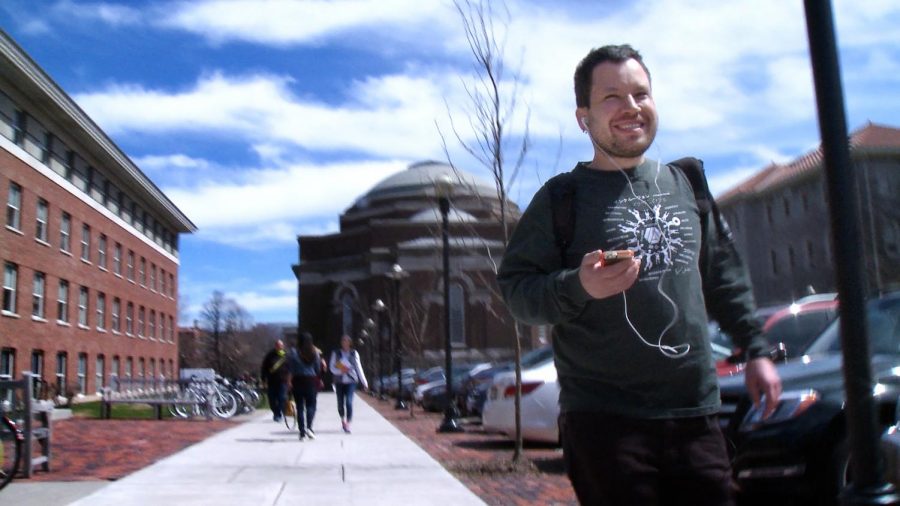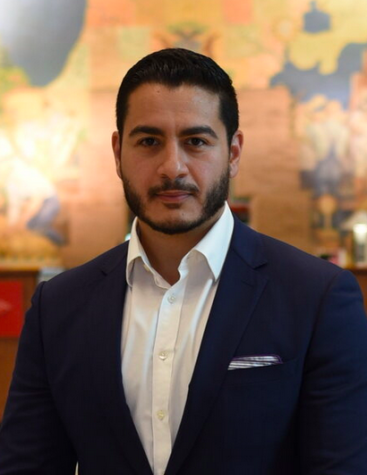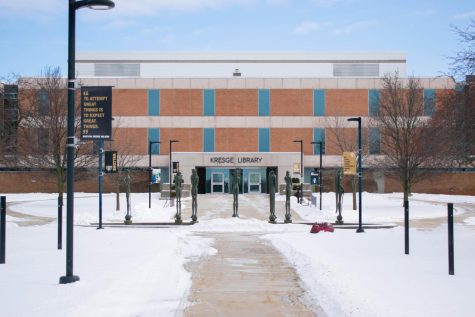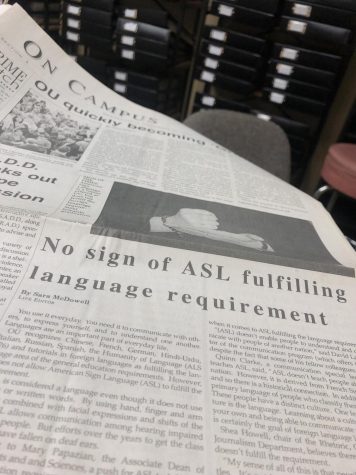Former OU student featured in documentary about intellectual disabilities
Hard working, humorous, determined, empathic, wise, not afraid to ask for help. These are all words to describe Micah Fialka-Feldman, a former OU student with an intellectual disability.
Fialka-Feldman was recently featured in a new documentary by award winning director Dan Habib called “Intelligent Lives.” The documentary followed the story of three young adults, Fialka-Feldman, Naieer Shaheed and Naomie Monplaisir, each of which had an intellectual disability, autism and down syndrome respectively.
Looking back
When Fialka-Feldman attended OU, he was an enrolled through the Oakland University Post Secondary Transitions, or OPTIONS, program that the university offered. The program’s goal was to provide students with mild cognitive disabilities “a fully inclusive, age appropriate post-secondary experience.”
For the winter semester of 2008, Fialka-Feldman applied to live on campus and was initially accepted. However, a few weeks before the semester started, he received a notice that he would not be allowed to live on campus. The reason that Fialka-Feldman was not allowed to live on campus was because he was not eligible to earn a degree due to the fact that he was not enrolled through the regular admissions process.
Unhappy at this notice, Fialka-Feldman appealed to the Oakland University Board of Trustees (BOT) on Sept. 17, 2008 to try and give himself and other OPTIONS students the opportunity to live on campus. Also in attendance to help him present his case was Elizabeth Bauer, a former member of the Michigan State Board of Education, and Richard Bernstein, an activist for disability rights and current associate judge on the Michigan Supreme Court.
“I can be more active on campus if I live in the dorm,” argued Fialka-Feldman during the meeting. “Everyone should get to be able to have a full education, and the chance to live in [campus residence] is part of that education.”
The board, after hearing Micah’s argument, said that they would “very seriously look at this request,” and review the university’s housing policies. That review took no more than a week because Fialka-Feldman received a letter from the board on Sept. 24, 2008 stating that the policy that barred him from living on campus would remain unchanged.
After repeated attempts to change the university policy, finally Fialka-Feldman had to resort to legal action. In November 2008, he filed a lawsuit against the OU BOT, saying that disallowing Micah from living on campus was a violation of his rights as a student.
“During the case I was questioned in a room,” Fialka-Feldman said. “They asked me, ‘How do leave during a fire drill?’ I said, ‘You go outside.’ Then the other question was ‘How do you wake up in the morning?’ I told them ‘I set an alarm clock.'”
Janice Fialka, Fialka-Feldman’s mother, talks about her time being questioned during the lawsuit. She had the same stenographer her son had. The stenographer said her son also had a disability and that she also needed to start advocating according to Fialka.
“My response to her was even if we don’t win the lawsuit, we won,” Fialka said.
Throughout his fight with the Oakland administration, Micah drew support from other students and the Oakland University Student Congress, as well as different local and national disability rights activists.
Finally on Dec. 28, 2009, Judge Patrick Duggan ruled that Fialka-Feldman had the right to live on campus at Oakland. Next month, in January 2010, he was finally able to move onto campus for his final semester at Oakland. After years of fighting, he was finally able to call Oakland’s campus his home.
Looking forward
Fialka-Feldman was approached by Habib about the documentary in Washington D.C. after being appointed by former President Barack Obama to serve on a presidential committee to help create laws to help people with disabilities, and how to advocate for their rights.
“Intelligent Lives” follows Fialka-Feldman over the course of three years as he works to get a non-degree certificate in disability studies from Syracuse University in New York. After graduating, he returned to Michigan for a brief period of time before landing a job as a teaching assistant at Syracuse University.
“I picked Syracuse because I knew Syracuse has been doing work in the field [of disabilities] since 1975, and I just knew that it was a great place,” Fialka-Feldman said.
The documentary also followed Fialka-Feldman and his love life. “Intelligent Lives” showcases his relationship with his then girlfriend, who Fialka-Feldman refers to as Maggie, who also has an intellectual disability. Unlike Fialka-Feldman, who is his own guardian, Maggie’s parents were her guardian.
“Maggie and I are still friends,” Fialka-Feldman said. “It was just hard because her parents would have to pick her up at like 10 p.m. when I wanted her to stay.”
To end the screening Fialka ended with a poem about breathing.
“…Just breathe, the wind insisted,” she read. “Easy for you to say. The weight of injustice is not wrapped around your throat cutting off all air. I need you to breathe. I need you to breathe.”














mel clayton • Oct 12, 2018 at 7:04 PM
I have known Micah since middle school in Berkley School District. My relationship is still ongoing through phone calls and emails. When in town, we try and meet for coffee and a bagel. During his secondary grades i worked with Micah, his family and school staff. There was little or no agreement on how to achieve Micah’s educational and employment goals. Micah’s parents were pioneers in introducing the concept of inclusion. Micah was included in all general education classes with support from a special education teacher consultant and me.
As one can see Micah was determined to become independent and establish his own goals. That he did and continues to do so living in Syracuse New York. Lesson learned, it’s important to listen to the student and especially the parents. great accomplishment Micah.